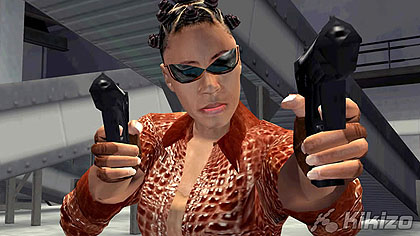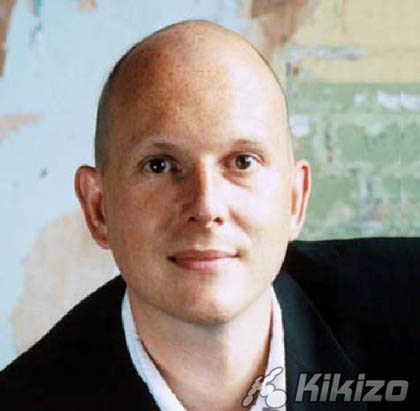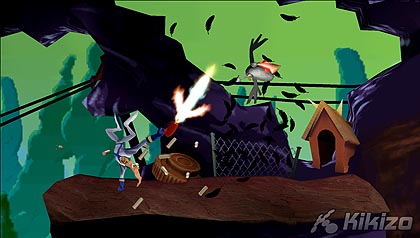Dave Perry: The Kikizo Interview
Huge interview with the games veteran and Acclaim CCO on California, cloud gaming, beast riding in Top Secret, MMOs success, Phil Harrison and Atari, returning to Earthworm Jim, and why a single console future will never happen.
Page 3
Kikizo: Cool. I want to ask you about Atari, who you were once with. What are your views on their future? Obviously they've hired Phil Harrison and they're looking at this multiplayer-only direction. Sometimes it's things that are a little bit more daring and unusual that stand the greatest chance of success these days. What do you think of the Infogrames strategy?
Perry: I really love the Atari brand. It's just still the most... I love it, I've experience it - I've worked for Atari and had an Atari business card. When I went through customs at the airport, I always had to stop and listen to their story: [thick accent]: "Oh man, Atari! When I was a kid..." - blah, blah, blah! I've never, ever had that from anything else. It's just the Atari brand - you get stopped wherever you go. And so what happened was when I left, I got together with a group of investors, we tried to buy Atari, the company - and they wouldn't even take the meeting.
Kikizo: I understand Infogrames is trying to regain full control over the US arm which it licenses Atari rights from... or something...
Perry: Yeah... the problem is that there is no Atari. Atari is a licensing deal that Infogrames has. And so what you really have is this entity called Infogrames running the show. And that was really generally the problem, is there isn't this separate Atari corporation that's free running and able to do anything it wants to do. You've got this big owner in the background, pulling all the strings. Phil is a very close friend of mine... and I am hoping that whatever Phil agreed to, they will not slow him down.
You may remember there is a guy called Jim Caparro [James Caparro]. He was hired as the president of Atari, and he only stayed for a very short period of time. He took the president's job at Atari, he was going to change the whole company. He was an incredibly impressive man - you should check his bio out. I went to his house once, he was from the music business. Someone said to me, "you should check out his garage - it's unbelievable". And I'm thinking, "oh, he's got some great cars". So I go in the garage, and it's a garage like this [widens arms], and every inch of the wall is covered in platinum and gold records that he's been involved in. And so much so, that where there's cupboards against the wall, they go behind the cupboards. And I'm looking at them, and it's like, "Dear Jim, thanks for your help with Thriller. Michael Jackson". You know, these kind of things just all over his garage. This is an impressive man, and his house is stunning. And the problem was, he came in and he just didn't feel like he had control of the company, to make the decisions he needed to make, to do what he needed to do. And he resigned very shortly afterwards. And so my concern is, if Phil is truly getting given the ropes, if they're giving Phil the steering wheel, then I'm excited. Phil gets it.
Kikizo: Of course he gets it, but he's more of a creative, technical pioneer; he didn't even wear a suit until he started going on stage. I mean it looks like David Gardner is the hard exec. I mean he looks like the fucking Terminator in his press shots. So it seems Phil is there to drive the creative strategy.
Perry: Right. Did you hear about that lunch with the luminaries? I had this private lunch at GDC with Phil, Peter Molyneux, Raph Koster, Neil Young, Chris Taylor - just this group of luminaries, and the idea was just to see what would happen if they just had this very frank conversation between everybody. [It was hosted by] a friend of mine Gary Whitta - there's a transcript of it on the web, you can see how frank it was. We invited a few press, like the BBC and people like that, just a few people. The rule was, the press were like flies on the wall, they basically got to listen into a conversation you would never get to listen into. And that's what I wanted to offer, and it worked - the next morning the title on GamesIndustry.biz said: "the best talk of GDC was not at GDC". And Phil just discloses some really... well, he basically said that he was very excited by where the world was going, and networking and Facebook and community and all this stuff, and that Sony just had a completely the opposite point of view. And for him to state it, the press were like, "oh my god". And so then he resigned. And what's hilarious is Neil Young who was at the meeting too ended up resigning and starting up his own phone gaming company with NTT DoCoMo - I don't know if you heard about that yet - but he was very, very high up in EA.
But the point is that these people - what I would class as visionary guys - are the ones that understand that this industry is about to change from being a retail business to a service business. And some people get it. That, when you go from retail to service - when you're a service business - it's actually all about your relationship with the gamers. And I've joked that the three 'golden rules' are community, community, community, but the idea is that you have to listen to them, understand them, you have to basically become one with the community if you want to succeed as a service business - and these guys get that. They're thinking: "how can I get there, how can I move forward? We're not just shipping boxes and then not caring less what happens when they've got them".
Kikizo: There was another school of thought that because the PS4 process is already getting underway, Phil didn't want to go through the whole thing again - that sort of embryonic phase of launching a console. I can see why he's moved on, I just hope it works out with this Atari thing.
Perry: Mm-hm. [Nods in agreement] Yeah, I have to admit, I've been waiting patiently to hear an announcement that makes me go, "I get it. I see". I've been watching projects like LittleBigPlanet, so I know that Phil is very connected to talented developers. And so I would love to see him sign exclusive deals, with companies that we know are going to make amazing games for them. I have no question that he has the connections and the ability and the power and everything to do it, so I think it's just a case of giving him a little bit of time to get himself coordinated, and planned, and I think we're going to start to see it.
Kikizo: Can you clarify the Acclaim setup and the ownership status? I frequently see "in partnership with" Acclaim in your publicity, but your business card says Chief Creative Officer.
Perry: I'm a co-founder of Acclaim [Games]. I'm Chief Creative Officer. And the relationship I have, which is part of my deal, is I'm allowed to continue to do some of the things that I was doing before - so GameInvestors is something I don't want to kill.








 Satoru Iwata Video Interview - the late Nintendo president spoke with Kikizo in 2004 as 'Nintendo Revolution' loomed.
Satoru Iwata Video Interview - the late Nintendo president spoke with Kikizo in 2004 as 'Nintendo Revolution' loomed. Kaz Hirai Video Interview - the first of Kikizo's interviews with the man who went on to become global head of Sony.
Kaz Hirai Video Interview - the first of Kikizo's interviews with the man who went on to become global head of Sony. Ed Fries Video Interview - one of Xbox's founders discusses an epic journey from Excel to Xbox.
Ed Fries Video Interview - one of Xbox's founders discusses an epic journey from Excel to Xbox. Yu Suzuki, the Kikizo Interview - we spend time with one of gaming's most revered creators.
Yu Suzuki, the Kikizo Interview - we spend time with one of gaming's most revered creators. Tetris - The Making of an Icon: Alexey Pajitnov and Henk Rogers reveal the fascinating story behind Tetris
Tetris - The Making of an Icon: Alexey Pajitnov and Henk Rogers reveal the fascinating story behind Tetris Rare founders, Chris and Tim Stamper - their only interview? Genuinely 'rare' sit down with founders of the legendary studio.
Rare founders, Chris and Tim Stamper - their only interview? Genuinely 'rare' sit down with founders of the legendary studio. The History of First-Person Shooters - a retrospective, from Maze War to Modern Warfare
The History of First-Person Shooters - a retrospective, from Maze War to Modern Warfare